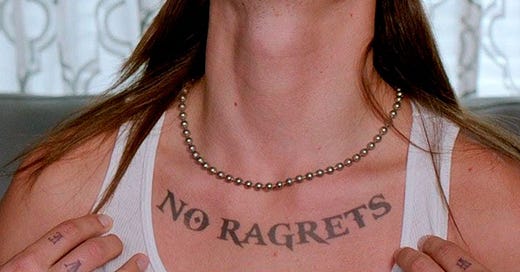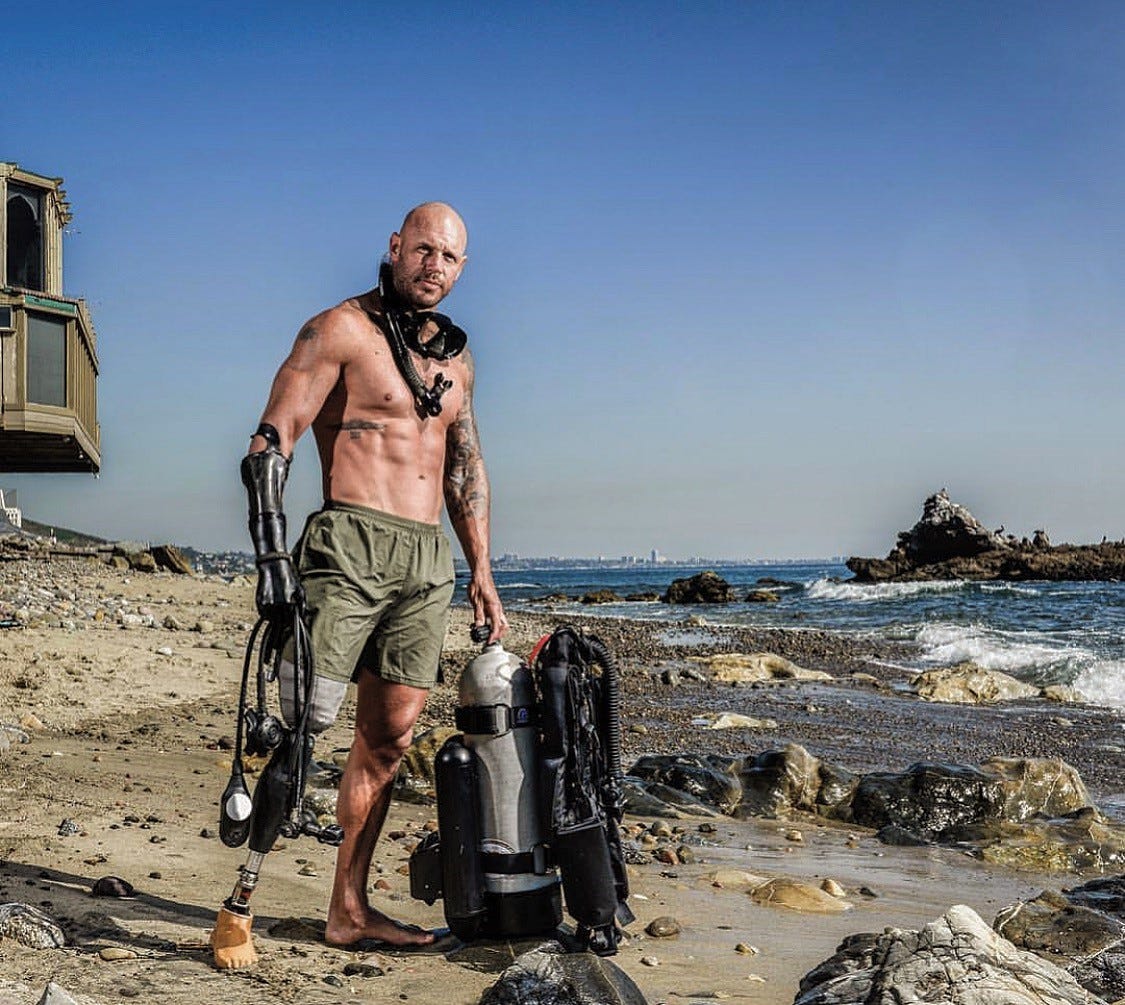My Aussie friend, Paul De Gelder was eaten alive by a shark.
Sydney Harbor, 7:00 am, Sydney, Australia, 2009. Serving as an elite Royal Australian Navy clearance diver, during rigorous underwater counter-terrorism training, Paul was attacked by a massive 10-foot Bull shark. In a moment, Paul’s left leg and hand were devoured, gone. And that he’s alive is a miracle. I’ve seen the photos, they are not pretty. And yet today, Paul, in extraordinary physical shape, navigating with two prosthetics, is a vegan, an advocate for shark preservation, a star of Discovery’s Shark Week, an author, and a public speaker.
Now, entering a new year, I was curious if Paul, a guy who had faced unthinkable horror and recovery, had any new year’s resolutions or harbored any regrets.
“No resolutions and no regrets, mate,” Paul told me. “Regrets are just lessons for the future and so are not really regrets.”
Here’s the overarching question to consider as we slide into 2023:
Are you using your resolutions and regrets to motivate you to be a better version of yourself, or will your resolutions and regrets reinforce negativity, lack, and feeling bad?
I asked Scott Galloway, NYU Stern School of Business professor, host of The Prof G Pod, co-host with Kara Swisher of the Pivot podcast, and someone I both trust and admire, if he was making any new year resolutions or had any regrets from this past year. (I was curious to hear what he had to say, especially because this year he upped and moved his family from the States to London.)
Scott told me, “No real regrets. My resolution is to figure out behaviors and practices that slow time down. I’ve become increasingly alarmed at the exponential rate time is passing.”
I’m hearing this often now from wildly successful people, especially after COVID. The world opened back up again, their candy jar is full and they have plenty of toys, and yet, the inevitable end of the game is closer than what feels comfortable, and that realization is shocking. Best for another post, but if you want to slow down time, get out of your head and into your heart. Find ways to connect with everything that’s alive. Humanity. Nature. The animal kingdom. Get out of your comfort lane and do something outrageously different from anything you’re used to. Race cars. Work part-time in a bakery. Build homes with Habitat for Humanity. Find ways to feel like a child. And serve. Serve. Serve.
Again for another time, but if you’re experiencing an existential crisis, get out of your head and find ways to stop feeling separate and alone, and more opportunities to feel passionate, enthusiastic, childlike, and connected to a wonderfully alive and vibrant world.
“My biggest regret is that I have no regrets.” - Dolly Parton
In April, Dolly Parton told organizational psychologist and Penn’s The Warton School, professor, Adam Grant on his podcast, WorkLife with Adam Grant, “My biggest regret is that I have no regrets. I don't look at my life in terms of regrets. Some people say those were mistakes. I said, ‘no,’ because what I did at the time was what I felt like I needed to be doing at the time. So I can't really call that a mistake or call it a regret. I was building.”
Regrets are like tools; what they create depends on the hands using them. Regrets can be powerful incentives for success if used as a learning device, a benchmark for progress to anchor yourself in the present moment with an attitude of self-forgiveness and reflection.
I remind my clients, it’s not what happens to you, it’s what you do with the experience. Victim or victor? Leader or follower? Blame or acceptance? How will you treat your regrets?
I, unlike Paul, Scott, and Dolly, have many regrets. I regret breaking up with a girlfriend when she was in the hospital for gallbladder surgery. I regret selling my Apple stock way too soon. I regret not moving to Los Angeles to pursue an acting career when I had the chance. I regret saying something stupid to David Letterman in a job interview, pissing him off, and not getting the staff writing gig. I regret in a moment of anger, falsely accusing my favorite son of lying. And I regret never going to college. And there are more.
And yet, despite my many regrets, I know that if one little thing had been different, nothing, and I mean nothing, in my life would be the same. In chaos theory, this is often referred to as The Butterfly Effect, suggesting that small, seemingly insignificant actions or events can have far-reaching, cascading, and often unpredictable consequences. Essentially, if one thing were different in your past, it would be physically impossible for you to have predicted the present. Yep, your life could have been better. You could have been richer, married someone else, had a better job and lived in a bigger home. But in truth, your life could have been terribly worse.
The flaw in harboring regrets is the impossibility of knowing what subsequent events would have occurred if anything had been different. That’s why your superpower is choice. The choice to accept the past. The choice to learn from our mistakes. The choice at this moment to move forward with compassion, forgiveness, hope, joy, positive expectation, and potentiality.
I’m crazy about Joanna Coles. Brilliant, former editor-in-chief of Cosmopolitan, and the inspiration for the successful TV show, The Bold Type. This week, Joanna opened her heart and told me, “I am sodden with regrets…but one can only move forward and learn from them and try not to repeat mistakes. My plan for 2023 is to read more, write more, scroll less, focus more, say yes less, and say no more.”
Gosh, this sounds like someone’s been reading my first book, One Less. One More. (Head’s up: I’m working on a new and revised 10th-anniversary edition, out end of next year.) In it I write:
“Remember, no held regret ever gets you closer to happiness. Once you commit to following your heart, you must also commit to gently and compassionately seeing yourself as whole and complete, releasing anything to the contrary.”
I’ve known Matt Murray for almost thirty years. Starting in The Wall Street Journal’s Pittsburgh bureau, Matt was named Editor-in-Chief in 2018. Soon, Matt will step down from his role to undertake another consequential, yet-to-be-announced new leadership challenge. I asked Matt if he had any regrets.
“The biggest regrets are for things NOT done—risks I didn’t take…” - Matt Murray, Editor-In-Chief, Wall Street Journal
“Like anyone, I have regrets about this or that thing or moment,” Matt told me. “But no one is perfect and I’ve learned that those can be teaching moments that make you better, so I wouldn’t count those as regrets that hang over me. The biggest regrets are for things NOT done—risks I didn’t take, calls I didn’t make, experiences I passed up that I should have done. Be ready for the unexpected to continue our way and seize it—my main regrets are when I failed to do that.”
This time of year is typically reflective and prone to thoughts about the past, and projections for the future. If you do have regrets, learn to frame them simply as experiences without “good” or “bad” labels. All of your power is in this present moment.
The wake behind a boat has no power for moving it forward. Regrets and resolutions serve the same purpose. Face forward. Come present. Choose a future you wish to experience, and move in that direction. 2023. You’ve got this.
Happy New Year.
Questions to Consider
Do I really believe I can or will achieve my New Year’s resolutions?
Do my New Year’s resolutions come from my head/ego, or my heart/happiness?
If I say publicly that I have no regrets, is that true? And if I don’t share my regrets publicly, why not?
What do my regrets teach me?
Do any of my regrets benefit me today?
What excuses about past regrets hamper me from achieving my hopes, dreams, and objectives today?
How would my life look differently if I no longer identified with my regrets?
How can I help?
If this post touched you and would like to learn more, or if you have ideas or suggestions for how I can improve Be the Bight, Not the Bulb, please don’t hesitate to reach out. And of course, if you or your team can benefit from heart-centered coaching, I’m here to assist.
Robbie Vorhaus
Robbie Vorhaus is a heart-centered leadership coach, crisis and reputation management advisor, entrepreneur, and wedding officiant, based in Austin, Texas. He is happily married to the artist, Candace Connors Vorhaus.





